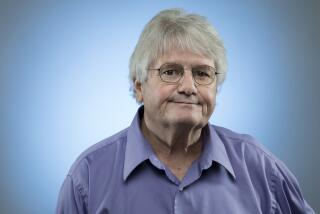A Melting Pot Jury Pool, but the Same Old Duty
Today’s slice of L.A. life goes out to those who want details on how America will look, getting-along-wise, as the new millennium unfolds. How will the melting pot play out? Will society be fairer? Will columnists still ladle up hoary cliches such as “melting pot” and “new millennium” and “getting along”?
Hard to muster much hope around that last question. But for clues to the first two, your correspondent visited the Los Angeles County Courthouse, where an assortment of prospective grand jurors were being called on the carpet yesterday. The scene was historic, as was its underlying situation, which began with the issuance of 500 court summonses this spring.
“Dear Citizen,” the summonses began, a greeting that, in itself, would come to sound ironic. “You have been selected by the Los Angeles County Superior Court for possible service as a criminal grand juror as authorized by Section 904.6 of the Penal Code.” This was a big deal. For 30 years, Los Angeles County’s Grand Jury, which investigates everything from government waste to capital murder cases, had been excoriated for being--how to put this delicately?--a bunch of old gringos nominated largely because they happened to be cronies of judges. Now, as of this month, there would be two grand juries, one for governmental investigations and one for the criminal matters. And, the second grand jury would be drawn, not from nominations, but from DMV lists and voter registration records, making the pool more ethnically diverse.
To understand this in the context of racial and ethnic relations here, consider that though Los Angeles County is 40% Latino, there wasn’t a single grand juror with a Spanish surname last year. Its makeup had scarcely changed since 1969, when a judge who’d nominated only members of his tennis club testified that he didn’t nominate any Latinos because his gardener was the only one he knew. So it was good news, if belated, that the grand jury pool finally would be broadened to look more like Greater Los Angeles. Problem was, the jury pool couldn’t help acting like Greater Los Angeles: Four out of five prospective grand jurors, regardless of race, creed or color, ignored their summonses.
*
This was the situation on Wednesday at 8:30 a.m. outside the courtroom of Los Angeles Superior Court Judge James Bascue. The first grand jury was to have been seated by now, but it was being postponed because, of the 118 who had answered the original summonses, only 18 were qualified to serve--far too few for a workable juror pool.
So the judge was calling no-shows in and demanding explanations. They’d been coming in for a week, a few sleepy dozen at a time. Most were ignoring the call the way they’d ignored the summons. Of the 25 people scheduled for yesterday, only 10 were there by the time the juror services workers began screening, and of those, five were immediately excused for reasons you tend not to see in non-melting-pot venues: Either they couldn’t speak English or they weren’t citizens.
One little old Armenian lady, dressed entirely in black, sat with her cane on a bench while her grandson tried to persuade the juror services people that she not only didn’t speak English, but was too old to be eligible.
“How old is she?”
The young man shouted a translation and the elderly woman launched into a rant that went on for sentences and sentences.
“See?” the grandson demanded, as if the court workers had the slightest idea what the woman was hollering. “I told you! Eighty-one!!”
There was a Latino in work boots who was in and out with the flash of a green card (though he’d missed work to make this appearance), and a student at Cerritos College, who missed her summons because her mom “doesn’t read English and didn’t know what it was and threw it out.” The good news was that the list of names truly did reflect L.A.’s cliched, millennial melting pot: “Duong, Villa, Orellano, Sivazlian, Zamora, Meza, Rodriguez, Rodriguez, Aropyan. . . .” The bad news was that three decades of struggle to open up membership in this influential local body had just been trumped by an even more universal cliche: Jury duty is a drag.
And just because something’s a cliche doesn’t mean it’s not true. Yes, the cases are stimulating and the contribution satisfying. But from the hard chairs to the paltry per diem to the hurrying up and waiting, just about everything else about jury duty is--in any language--a discouragement. When the last five stragglers finally got into the courtroom to tell the judge, in person, why diversity would have to struggle on without them, they were abruptly ordered to come back at 8:30 a.m. Friday. Judge Bascue, it turned out, had called in sick.
*
Shawn Hubler’s column appears Mondays and Thursdays. Her e-mail address is [email protected].
More to Read
Sign up for Essential California
The most important California stories and recommendations in your inbox every morning.
You may occasionally receive promotional content from the Los Angeles Times.









